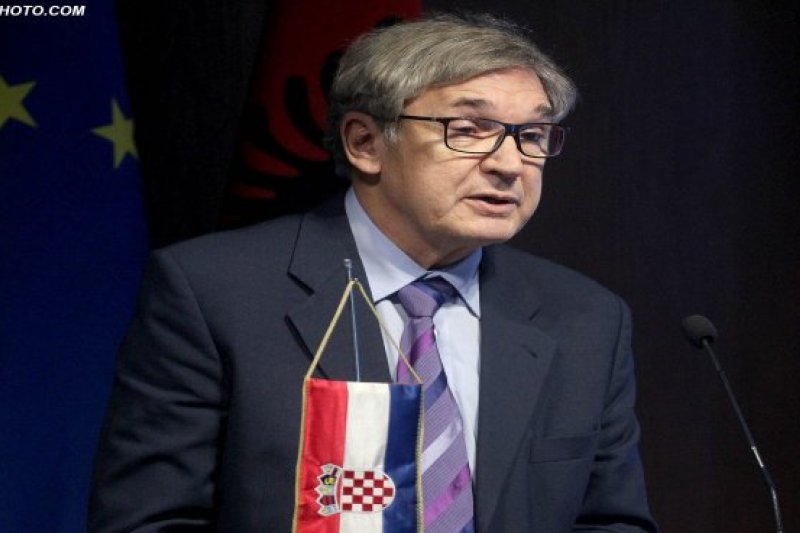Exclusive/Croatian Ambassador to Tirana: Communism, Fascism, and the Balkans
Albanian Daily News had an exclusive interview with the Ambassador of Croatia to Albania, Zlatko Kramaric after the launching of his book 'Critique of the Political Mind' (Kritike mbi mendjen politike) a few days ago in Tirana.
The Ambassador unveiled the content of the book and which were the motives that encouraged him to write this work and publish it in Albanian. But he hasten to revel that “This is my first book in the Albanian language, but I want to believe it's not the last! ‘Albanian themes’ will be on the agenda below, in the second edition of this book… Well, that will be a good opportunity to translate that book into Albanian as well. If the reception of this book in the Albanian political-academic community is positive, then it will be one more incentive to describe the 'Albanian political mind' - believe me, there is enough material for an interesting book. Honestly, this challenge as a political commentator makes me extremely happy!”
“The eternal theme of the relationship between two totalitarianisms, fascism and communism, and their negative effects in Croatian society, this book of mine 'opens'. And all the other texts are just derivatives, that is, the elaboration of that big and difficult theme, which we have never managed to free ourselves from,” stressed the author of the book.
Asked if the political thought of the Balkan countries, aspirants of membership in the union, should be a special topic of the overall accession platform because much is spoken about the difference between the Balkan thought and the European one as well as the behavior of politicians, the Ambassador said: “There is certainly something fascinating in the Balkans. As you probably know, my diplomatic career took place exclusively in the Balkan countries. And that was my conscious choice. Finally, in addition to philosophy, I studied Slavic studies, Slavic languages, literature and culture. And there is no doubt that this fact significantly determined me. We are talking about books that explore the relationship between Europe and the Balkans, about the Balkans as an unconscious moment of the Europe, the Balkans as 'the other', as a 'wild thought'. And, of course, all these perceptions about the Balkans then find their place in the official EU- political discourse.”
In conclusion Ambassador Kramaric said in the following interview: “I don't see anything wrong with identity politics. Indeed! Those types of policies certainly have their positive function. Therefore, I am inclined to those political strategies that are based on the preservation of national identities, own peculiarities. Of course, you shouldn't exaggerate that either. It is always important to have a sense of proportion, to find the right balance between EU value and national peculiarities. We should not just give up our own traditions, which we will adapt in an extremely discreet way to new political circumstances, demands/challenges that are the result of new, modern times.”
Albanian Daily News: A few days ago your book Critique on Political Mind (Kritike mbi Mendjen Politike) in Albanian was published in Tirana. First of all Mr. Ambassador ADN’s reader would like to know the content of the book and which were the motives that encouraged you to write this work and is it the first in Albanian?
-Croatian Ambassador Zlatko Kramaric: The book 'Critique of the Political Mind', which recently appeared in the Albanian language, is a translation of the book of the same name, which was also published in the Croatian language in 2022. It is about a book that I have been working on for several years, from 2017 to 2021, and recorded and commented on recent political and cultural events in Croatia, and partly on those in the region, which had a significant impact on political and other processes (here, I was primarily thinking of the idea of creating a 'Serbian world'; it is an idea that significantly affects political life, politics processes in the region, Bosnia, Montenegro, Kosovo, North Macedonia ...).
How time stands still in these regions (at least that's what the writer Ivo Andric, winner of the Nobel Prize for Literature in 1961 said. So the Second World War is still going on in Croatia, because none of the opposing ideological options in Croatia is satisfied with the outcome of the Second World War - sic! ) I decided to follow the most important political and cultural events and immediately comment on them. Namely, it is more than obvious that the Croatian political public still has not faced its recent past, so we are by no means managing to properly/adequately define ourselves against fascism and communism; no way to understand that it is about two totalitarianisms, two great world evils, fascism & communism, which did not make us a happy society.
That eternal theme of the relationship between two totalitarianisms, fascism and communism, and their negative effects on Croatian society this book of mine 'opens'. And all the other texts are just derivatives, that is, the elaboration of that big and difficult theme, which we have never managed to free ourselves from.
Yes, this is my first book in the Albanian language, but I want to believe it's not the last!
- Does the book deal with the thought and performance of Albanian politics and secondly what do you think of the Albanian political thought vis-à-vis the Balkan one, but why not even vis-à-vis the Croatian thought?
- "Albanian themes" will be on the agenda below, in the second edition of this book. As I already said in the previous answer - this book was created as a result of my observations of recent cultural and political events, first of all, in Croatian society. Furthermore, I am still a diplomat and I am bound by certain international conventions. It would not be polite for me, as the Croatian ambassador to Albania, to write critically about the Albanian political mind. However, this does not mean that I do not regularly record all relevant political events in Albania. Therefore, the Albanian addition to the critique of the political mind will have to wait a bit. However, as soon as my mandate ends, I will devote myself more seriously to that topic as well.
Well, that will be a good opportunity to translate that book into Albanian as well. If the reception of this book in the Albanian political-academic community is positive, then it will be one more incentive to describe the 'Albanian political mind' - believe me, there is enough material for an interesting book. Honestly, this challenge as a political commentator makes me extremely happy!
- Should the political thought of the Balkan countries, aspirants of membership in the union, be a special topic of the overall accession platform because much is spoken about the difference between the Balkan thought and the European one as well as the behavior of politicians?
- There is certainly something fascinating in the Balkans. As you probably know, my diplomatic career took place exclusively in the Balkan countries. And that was my conscious choice. Finally, in addition to philosophy, I studied Slavic studies, Slavic languages, literature and culture. And there is no doubt that this fact significantly determined me. Finally, the literature on the Balkans is huge. Bulgarian historian Maria Todorova wrote a great book 'Imaginary Balkans', and Edward Said about Orientalism. We are talking about books that explore the relationship between Europe and the Balkans; about the Balkans as an unconscious moment of the Europe, the Balkans as 'the other', as a 'wild thought'. And, of course, all these perceptions about the Balkans then find their place in the official EU- political discourse. And that shouldn't mean anything, but problems appear the moment Balkan politicians start their activities to confirm all these EU-stereotypes about the Balkans with their political activities.
- The political mind thought is conditioned by many factors of each country but it is progressive development. Which are the ways to develop it in the European democratic spirit especially amongst the younger generations and could the EU Balkan countries like Croatia play a role in this endeavor?
- I think that many things, including EU-democratic standards, should be relaxed, should be demystified. Nothing in this world is self-explanatory, not everything in Europe is great, just as the Balkans should not be experienced a priori as something negative, bad.
I don't see anything wrong with identity politics. Indeed! Those types of policies certainly have their positive function. Therefore, I am inclined to those political strategies that are based on the preservation of national identities, own peculiarities. Of course, you shouldn't exaggerate that either. It is always important to have a sense of proportion, to find the right balance between EU value and national peculiarities. We should not just give up our own traditions, which we will adapt in an extremely discreet way to new political circumstances, demands/challenges that are the result of new, modern times.
-What should be preserved and developed regarding the good traditions for example in the case of the Albanian political thought?
- Unfortunately, I know too little about the history of Albanian political thought. So I wouldn't dare give any advice. The only thing I can tell the Albanian political and academic public is to understand that democratic processes have no alternatives!
However, I have to admit that one topic from the recent Albanian past is extremely attractive to me. It is about the relationship between E. Hoxha and the world-famous writer I. Kadare. In this book of mine, I only referred in passing to some aspects of the relationship between Tito and M. Krleza, the most important Croatian and Yugoslav writer, about that very delicate relationship, the relationship between Power/Power vs. Artists in Croatia (but. There is a huge literature in other Yugoslav areas as well. My knowledge of the Albanian language is more than modest, so I only know what my Albanian friends tell me about the relationship between a cruel dictator and a great writer. However, this is very limited information, which does not allow me a real/adequate insight into this undoubtedly very interesting, politically friendly relationship, from which a lot can be learned about the structure of the Albanian political mind. Therefore, I will definitely try to find some texts that would enable me to critically analyze that relationship. I will say right away that I am very critical of the political activities of M. Krleza after 1945. However, he compensated for his political cowardice, incomprehensible fear of the government (we are talking about a hard-to-understand weakness towards Tito, his Bolshevism, hedonism...) with his cultural activities! It would be interesting to analyze how Kadare resolved that quadrature of the political circle, how he rationalized the extremely irrational behavior of the dictator, his decisions.
-Mr. Ambassador, you have been very connected and shrewd with Albanian political life and in many cases you have expressed yourself in many aspects. Which is your thought on this and do you have any plans to publish any book or else on Albanian political thought?
- Of course, my insight into current political processes in Albania is much better than my insight into the history of Albanian political thought. And when my mandate ends, then I will certainly write a book about Albanian (Balkan, namely I also want to write about my experiences in Pristina, Skopje, Banja Luka...) to political thought. After the end of the mandate, not only will I be freed from strict international conventions, but I will also have the much-needed distance (both temporal and spatial), so I will be able to freely articulate my opinion on political and other relations in Albanian society, which is going through a very painful transition. And perhaps nowhere else is seen as much as it is seen in Albanian society- this conflict between the old totalitarian political models and new, modern democratic tendencies.














